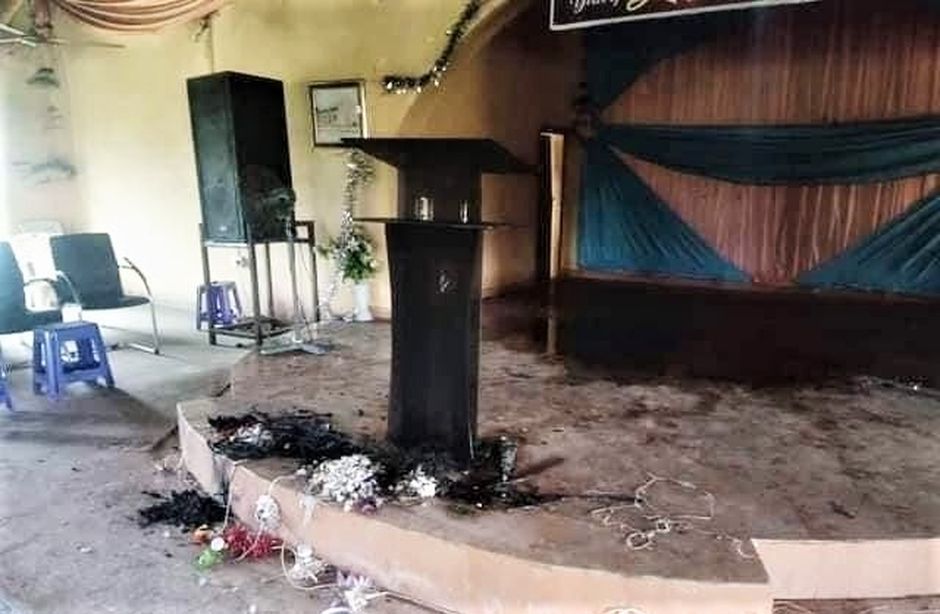Fulani herdsmen attacked a village, burned the a Baptist church, killed a man and abducted seven Christians.
 Damage from fire set at Baptist church building in Damba Kasaya village, Kaduna state, Nigeria.. / Morning Star News.
Damage from fire set at Baptist church building in Damba Kasaya village, Kaduna state, Nigeria.. / Morning Star News.
Fulani herdsmen attacked a predominantly Christian village in north-central Nigeria, killing one resident, burning a church building and kidnapping four children among others on Monday (Aug. 24), sources said.
More than 20 herdsmen rode into Damba Kasaya village, Kaduna state, on motorcycles at about 8 a.m. in an attack in which they kidnapped four students, including a 10-year-old girl, from a school.
“Our church, Aminchi Baptist Church, here in Damba Kasaya, was burned, and Mr. Benjamin Auta, aged 35, was killed during the attack”, village resident Nuhu Aruwa told Morning Star News by text message.
Local news reports said Auta was killed while pursuing the fleeing herdsmen, but Aruwa said they killed him in his house, which is close to the school where the students were kidnapped. The herdsmen abducted seven Christians from the village in Chikun County, he said.
“Among them were four students of Prince Academy and one of their teachers”, Aruwa said. “Two other Christian farmers, a woman and a man, were captured and taken away too by the herdsmen”.
Village resident Emmanuel Zakka said three girls were kidnapped among the students – 10-year-old Favour Danjuma, Miracle Saitu Danjuma, 15, and Happiness Odoji, 16 – along with Ezra Bako, 17. Zakka identified the kidnapped teacher as Christiana Madugu, 29.
In the same county’s Damishi village, herdsmen reportedly abducted six Christians on Saturday (Aug. 22) from a hotel where they had taken refuge after Fulani herdsmen attacked their village. Two of the six kidnapped were women nursing babies.
On Saturday (Aug. 22) in Kakura village, in the Kajuma area also in Chikun County, Muslim Fulani herdsmen reportedly kidnapped an Anglican priest and his 10-year-old son. The Rev. Meshach Luka of the Anglican Diocese of Kaduna and his son were kidnapped from his station at Kakura II Kujama Missionary Archdeaconry.
They were freed on Monday (Aug. 24), according to the Hausa Christians Foundation, without providing details of their release. The assaults were the latest in an acceleration of herdsmen attacks this year in Kaduna state.
More than 50,000 Christians have been displaced from 109 villages now occupied by armed Fulani herdsmen in Kachia, Kajuru, Chikun and Kaura counties, all in southern Kaduna state, according to Luka Binnayat Southern Kaduna People’s Union (SOKAPU).
Numbering in the millions across Nigeria and the Sahel, predominantly Muslim Fulani comprise hundreds of clans of many different lineages who do not hold extremist views, but some Fulani do adhere to radical Islamist ideology, the United Kingdom’s All-Party Parliamentary Group for International Freedom or Belief (APPG) noted in a recent report.
“They adopt a comparable strategy to Boko Haram and ISWAP [Islamic State West Africa Province] and demonstrate a clear intent to target Christians and potent symbols of Christian identity”, the APPG report states.
Christian leaders in Nigeria have said they believe herdsmen attacks on Christian communities in Nigeria’s Middle Belt are inspired by their desire to forcefully take over Christians’ lands and impose Islam as desertification has made it difficult for them to sustain their herds.
The APPG report noted that tribal loyalties cannot be overlooked.
“In 2015, Muhammadu Buhari, a Fulani, was elected president of Nigeria. He has done virtually nothing to address the behavior of his fellow tribesmen in the Middle Belt and in the south of the country”, the group reported..
On Jan. 30 Christian Solidarity International (CSI) issued a genocide warning for Nigeria, calling on the Permanent Member of the United Nations Security Council to take action. CSI issued the call in response to “a rising tide of violence directed against Nigerian Christians and others classified as ‘infidels’ by Islamist militants in the country’s north and middle belt regions.’”
Nigeria ranked 12th on Open Doors’ 2020 World Watch List of countries where Christians suffer the most persecution but second in the number of Christians killed for their faith, behind Pakistan.

Las opiniones vertidas por nuestros colaboradores se realizan a nivel personal, pudiendo coincidir o no con la postura de la dirección de Protestante Digital.
Si quieres comentar o